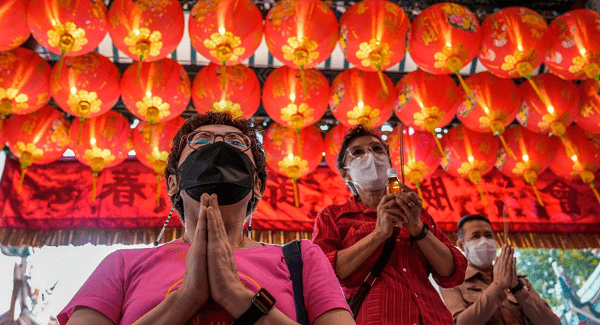The coronavirus pandemic is once again dampening Lunar New Year celebrations in China and elsewhere in Asia, even as increasing vaccination rates raised hopes that the Year of the Tiger might bring life back closer to normal.
The Lunar New Year – the most important annual holiday in China – falls on Tuesday, February 1 and brings in the Year of the Tiger.
Each year is named after one of 12 signs of the Chinese zodiac in a repeating cycle. Last year was the Year of the Ox.
This will be the third new year in a row celebrated in the shadow of the pandemic. It was two days before the holiday in 2020 that China locked down Wuhan – a city of 11 million people – following the detection of the coronavirus there. Some 85 percent of Chinese people are now fully vaccinated, according to Our World in Data, and more Chinese have been travelling domestically this year, despite government warnings.
This year, the celebrations coincide with the Beijing Winter Olympics, which open near the end of the weeklong holiday. The Chinese capital has been tightening controls to contain outbreaks ahead of the sporting event.
In Hong Kong, which saw a surge in cases in January, people wore surgical masks as they shopped for red and tiger-themed holiday items. The city has closed schools because of outbreaks and required restaurants to close at 6pm, forcing many to have their traditional New Year’s Eve family dinners at home.
Elsewhere in Asia, there were signs that celebrations might not be as subdued as they were last year. Despite ongoing pandemic restrictions, most people have now received two vaccine shots in many regional countries.
In the old quarter of Hanoi, people flocked on the weekend to the traditional market to get decorations and flowers for the festival, known as Tet in Vietnam.
Vietnam’s daily case count remains at about 15,000 new infections but its low hospitalisation and death rate has allowed the country to reopen for business and cautiously resume social activities.
More than 70 percent of Vietnamese people are fully vaccinated, and 80 percent have had at least one shot, according to Our World in Data.
In Thailand, where 69 percent of people are fully vaccinated, Bangkok decided not to hold traditional Lunar New Year celebrations in Chinatown for the second year in a row but was going ahead with lighting seasonal lanterns on the district’s main street.
In Singapore, Lunar New Year celebrations are more subdued due to coronavirus restrictions that allow residents to receive only five unique visitors a day, and preferably only one visit daily. The rules are likely to get in the way of the tradition of visiting relatives during the holiday.
Business was brisk at a flower market in the Taiwanese capital of Taipei on Monday as people made last-minute purchases. Some 73 percent of Taiwanese are fully vaccinated.
Ethnic Chinese shopkeepers in Myanmar face a bigger dilemma, as the new year coincides with the one-year anniversary of the military’s seizure of power from the democratically elected government.
Supporters of the growing anti-military movement have called for people to close their shops and businesses in a nationwide “silent strike” from 10am to 4pm. People have responded to the call, in defiance of the military leaders who warned that anyone who participates could face legal action, including charges of violating the country’s counterterrorism law
Source: Al Jazeera

















